L'Après-midi d'un Faune (The Afternoon of a Faun)
L'Après-midi d'un Faune (The Afternoon of a Faun)
Stéphane Mallarmé's eclogue “L'Après-midi d'un Faune” ("The Afternoon of a Faun") was published in 1876. Debussy first set a poem by Mallarmé to music in 1884, at the age of 22. Three years later, the young composer joined the circle of poets and artists who met at Mallarmé's house every Tuesday night for discussions and companionship. Thus he was thoroughly familiar with the poet's style before he began work on his prelude to "The Afternoon of a Faun" in 1892.
Debussy - The Afternoon of a Faun
Stéphane Mallarmé (1842-1898) was one of the greatest innovators in the history of French poetry. His works, which abound in complex symbols and images, seek to represent states of mind rather than ideas, express moods rather than tell stories.
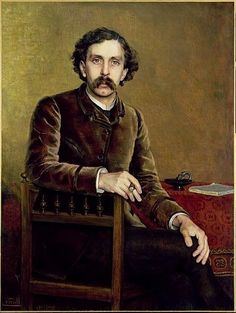
Stéphane Mallarmé
This poem is about a faun who awakes in the mist of forest nymphs. The first-person narrator is a faun, a mythological creature who is half man and half goat. The faun lives in the woods, near a river surrounded by reedy marshes; he is daydreaming about nymphs who may be real or mere figments of his imagination. The faun's desire is filtered through the vagueness of its object as he recalls past dreams, which emerge from the shadows only to recede into the darkness again.
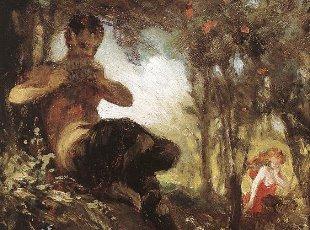
Faun (& nymph)
Debussy pondered the poetic source material for many years. “The Afternoon of a Faun” deals with a faun’s erotic fantasies inspired by nymphs (“Was it a dream I loved?”). The classical setting and overt sexuality of the text made it a touchstone for debates over the future of literature. Debussy’s tastes made him susceptible to the poem’s allure, for he had already begun setting similar texts by Baudelaire and Maeterlinck when work on the Prelude commenced in 1892. At first, he planned a full accompaniment to each moment of the poem, perhaps even a mini staged drama. But by the time of completion, he had wisely settled on a “very free illustration of the beautiful poem of Mallarmé.”
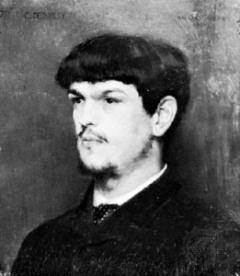
Claude Debussy, 1884
The iconic opening theme outlines a descending tritone from C-sharp to G natural using solo flute. Uncertain tonal implications are given new light when the theme subsequently receives a harmonic foundation in a seventh chord on D. Above shimmering glissandi in harp and pulsating chromatic motion in the winds, the flute arabesques become gradually more ornate, more seductive.

Main theme, flute solo
The flute’s theme, recurring throughout the work, though it is not intended as a literal translation of the poem. The line progresses throughout the piece and its metamorphoses account for the Prelude’s richness of texture and harmony.
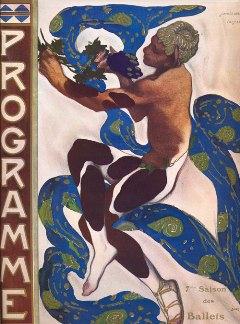
Nijinsky as Faun
Debussy closes the first section in B major and then moves into a more agitated episode culminating in soaring strings. Tonal color, built from radiant mixtures of whole-tone and pentatonic elements, turns gently to A flat major. The next scene, (a pas de deux in Nijinsky’s choreographed version,) suggests the faun embracing a nymph. Its poignant union of rapture and longing centers on the tritone-related chord progression. Debussy’s lines undulate and swell, rise and recede. At the last part of the dance, he calms the rampant sensuality down to a violin solo leading seamlessly to a reprise of the opening theme. Almost the entire final three minutes are needed to cool off from the heat of passionate embraces. At the last, Debussy’s faun strikes a languorous pose in serene E major.
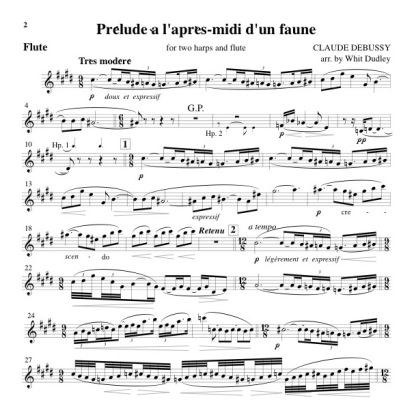
The afternoon ..., flute score
About his composition Debussy wrote: “The music of this prelude is a very free illustration of Mallarmé’s beautiful poem. By no means does it claim to be a synthesis of it. Rather there is a succession of scenes through which pass the desires and dreams of the faun in the heat of the afternoon. Then, tired of pursuing the timorous flight of nymphs and naiads, he succumbs to intoxicating sleep, in which he can finally realize his dreams of possession in universal Nature.”
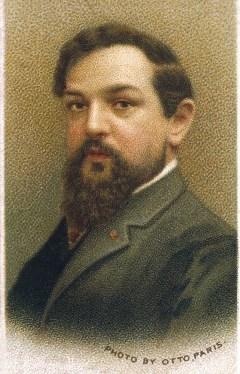
Claude Debussy
Paul Valéry reported that Mallarmé himself was unhappy with his poem being used as the basis for music: “He believed that his own music was sufficient, and that even with the best intentions in the world, it was a veritable crime as far as poetry was concerned to juxtapose poetry and music, even if it were the finest music there is.”
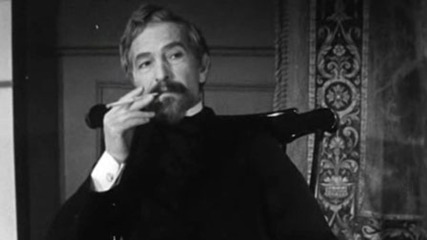
Stéphane Mallarmé
However, Maurice Dumesnil states in his biography of Debussy that Mallarmé was enchanted by Debussy’s composition, citing a short letter from Mallarmé to Debussy that read: “I have just come out of the concert, deeply moved. The marvel! Your illustration of the Afternoon of a Faun, which presents a dissonance with my text only by going much further, really, into nostalgia and into light, with finesse, with sensuality, with richness. I press your hand admiringly, Debussy. Yours, Mallarmé.”
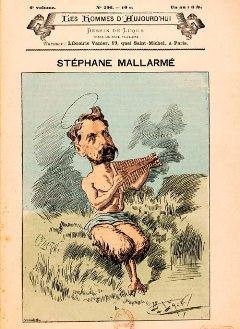
Stéphane Mallarmé as Faun
Prelude to “The Afternoon of a Faun” signaled a new era in compositional style and intent, even though that new style was not to everyone’s liking. Some saw it as a liberation from the weighty textures and Teutonic mythology that Wagnerism had spread over much European music. Debussy was leaner and more evocative. Others thought it did not go nearly far enough in that direction; the Prelude’s dreamy use of non-tonal pitch collections effused a world of shadows and perfume when a harsh dose of bright reality was needed.
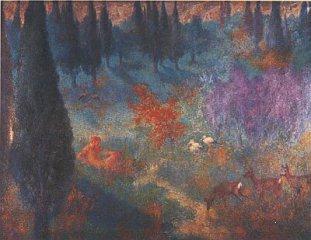
Afternoon of Faun by Levy-Dhurmer
Two aspects of Debussy's style bear special mention here: his use of chromaticism and his handling of orchestral color. Chromaticism had been one of the main musical means to express sensuality at least since Wagner's Tristan und Isolde, a work that exerted a decisive influence on the young Debussy. But Debussy's use of chromaticism is more subdued and less goal-oriented than Wagner's. His instrumentation, much more restricted than Wagner's (no brass except horns, no percussion except the soft-toned antique cymbals) causes us to perceive the faun's sensuality at a certain remove. Mallarmé referred to the faun's syrinx as an "instrument des fuites" (translated as "elusive instrument"; literally, perhaps, "instrument of evasion"); with his novel rhythmic and harmonic language, Debussy managed to render that elusive/evasive quality of the faun's self-expression.
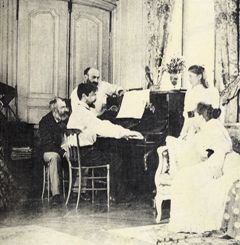
Claude Debussy, 1893
It was first performed in Paris on 22 December 1894, conducted by Gustave Doret. The flute solo was played by Georges Barrère.
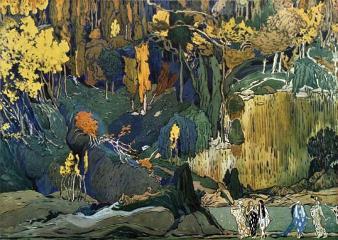
Afternoon of Faun
Stephane Mallarmé - L'après-midi d'un faune (Églogue)
Le Faune: Ces nymphes, je les veux perpétuer. Si clair, Leur incarnat léger, qu'il voltige dans l'air Assoupi de sommeils touffus. Aimai-je un rêve ? Mon doute, amas de nuit ancienne, s'achève En maint rameau subtil, qui, demeuré les vrais Bois mêmes, prouve, hélas ! que bien seul je m'offrais Pour triomphe la faute idéale de roses. Réfléchissons... ou si les femmes dont tu gloses Figurent un souhait de tes sens fabuleux ! Faune, l'illusion s'échappe des yeux bleus Et froids, comme une source en pleurs, de la plus chaste : Mais, l'autre tout soupirs, dis-tu qu'elle contraste Comme brise du jour chaude dans ta toison ? Que non ! par l'immobile et lasse pâmoison Suffoquant de chaleurs le matin frais s'il lutte, Ne murmure point d'eau que ne verse ma flûte Au bosquet arrosé d'accords ; et le seul vent Hors des deux tuyaux prompt à s'exhaler avant Qu'il disperse le son dans une pluie aride, C'est, à l'horizon pas remué d'une ride Le visible et serein souffle artificiel De l'inspiration, qui regagne le ciel. O bords siciliens d'un calme marécage Qu'à l'envi de soleils ma vanité saccage Tacite sous les fleurs d'étincelles, Contez « Que je coupais ici les creux roseaux domptés « Par le talent ; quand, sur l'or glauque de lointaines « Verdures dédiant leur vigne à des fontaines, « Ondoie une blancheur animale au repos : « Et qu'au prélude lent où naissent les pipeaux « Ce vol de cygnes, non ! de naïades se sauve « Ou plonge... » Inerte, tout brûle dans l'heure fauve Sans marquer par quel art ensemble détala Trop d'hymen souhaité de qui cherche le la : Alors m'éveillerai-je à la ferveur première, Droit et seul, sous un flot antique de lumière, Lys ! et l'un de vous tous pour l'ingénuité. Autre que ce doux rien par leur lèvre ébruité, Le baiser, qui tout bas des perfides assure, Mon sein, vierge de preuve, atteste une morsure Mystérieuse, due à quelque auguste dent ; Mais, bast ! arcane tel élut pour confident Le jonc vaste et jumeau dont sous l'azur on joue : Qui, détournant à soi le trouble de la joue, Rêve, dans un solo long, que nous amusions La beauté d'alentour par des confusions Fausses entre elle-même et notre chant crédule ; Et de faire aussi haut que l'amour se module Évanouir du songe ordinaire de dos Ou de flanc pur suivis avec mes regards clos, Une sonore, vaine et monotone ligne. Tâche donc, instrument des fuites, ô maligne Syrinx, de refleurir aux lacs où tu m'attends ! Moi, de ma rumeur fier, je vais parler longtemps Des déesses ; et par d'idolâtres peintures A leur ombre enlever encore des ceintures : Ainsi, quand des raisins j'ai sucé la clarté, Pour bannir un regret par ma feinte écarté, Rieur, j'élève au ciel d'été la grappe vide Et, soufflant dans ses peaux lumineuses, avide D'ivresse, jusqu'au soir je regarde au travers. O nymphes, regonflons des souvenirs divers. « Mon œil, trouant le joncs, dardait chaque encolure « Immortelle, qui noie en l'onde sa brûlure « Avec un cri de rage au ciel de la forêt ; « Et le splendide bain de cheveux disparaît « Dans les clartés et les frissons, ô pierreries ! « J'accours ; quand, à mes pieds, s'entrejoignent (meurtries « De la langueur goûtée à ce mal d'être deux) « Des dormeuses parmi leurs seuls bras hasardeux ; « Je les ravis, sans les désenlacer, et vole « A ce massif, haï par l'ombrage frivole, « De roses tarissant tout parfum au soleil, « Où notre ébat au jour consumé soit pareil. » Je t'adore, courroux des vierges, ô délice Farouche du sacré fardeau nu qui se glisse Pour fuir ma lèvre en feu buvant, comme un éclair Tressaille ! la frayeur secrète de la chair : Des pieds de l'inhumaine au cœur de la timide Qui délaisse à la fois une innocence, humide De larmes folles ou de moins tristes vapeurs. « Mon crime, c'est d'avoir, gai de vaincre ces peurs « Traîtresses, divisé la touffe échevelée « De baisers que les dieux gardaient si bien mêlée : « Car, à peine j'allais cacher un rire ardent « Sous les replis heureux d'une seule (gardant « Par un doigt simple, afin que sa candeur de plume « Se teignît à l'émoi de sa sœur qui s'allume, « La petite, naïve et ne rougissant pas : ) « Que de mes bras, défaits par de vagues trépas, « Cette proie, à jamais ingrate se délivre « Sans pitié du sanglot dont j'étais encore ivre. » Tant pis ! vers le bonheur d'autres m'entraîneront Par leur tresse nouée aux cornes de mon front : Tu sais, ma passion, que, pourpre et déjà mûre, Chaque grenade éclate et d'abeilles murmure ; Et notre sang, épris de qui le va saisir, Coule pour tout l'essaim éternel du désir. A l'heure où ce bois d'or et de cendres se teinte Une fête s'exalte en la feuillée éteinte : Etna ! c'est parmi toi visité de Vénus Sur ta lave posant tes talons ingénus, Quand tonne une somme triste ou s'épuise la flamme. Je tiens la reine ! O sûr châtiment... Non, mais l'âme De paroles vacante et ce corps alourdi Tard succombent au fier silence de midi : Sans plus il faut dormir en l'oubli du blasphème, Sur le sable altéré gisant et comme j'aime Ouvrir ma bouche à l'astre efficace des vins ! Couple, adieu ; je vais voir l'ombre que tu devins.
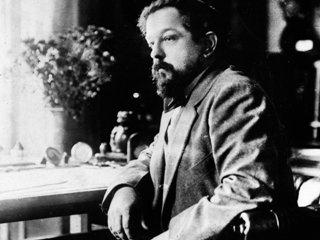
Claude Debussy
The Afternoon of a Faun (English translation)
The Faun: These nymphs, I would perpetuate them. So bright Their crimson flesh that hovers there, light In the air drowsy with dense slumbers. Did I love a dream? My doubt, mass of ancient night, ends extreme In many a subtle branch, that remaining the true Woods themselves, proves, alas, that I too Offered myself, alone, as triumph, the false ideal of roses. Let’s see…. or if those women you note Reflect your fabulous senses’ desire! Faun, illusion escapes from the blue eye, Cold, like a fount of tears, of the most chaste: But the other, she, all sighs, contrasts you say Like a breeze of day warm on your fleece? No! Through the swoon, heavy and motionless Stifling with heat the cool morning’s struggles No water, but that which my flute pours, murmurs To the grove sprinkled with melodies: and the sole breeze Out of the twin pipes, quick to breathe Before it scatters the sound in an arid rain, Is unstirred by any wrinkle of the horizon, The visible breath, artificial and serene, Of inspiration returning to heights unseen. O Sicilian shores of a marshy calm My vanity plunders vying with the sun, Silent beneath scintillating flowers, RELATE ‘That I was cutting hollow reeds here tamed By talent: when, on the green gold of distant Verdure offering its vine to the fountains, An animal whiteness undulates to rest: And as a slow prelude in which the pipes exist This flight of swans, no, of Naiads cower Or plunge…’ Inert, all things burn in the tawny hour Not seeing by what art there fled away together Too much of hymen desired by one who seeks there The natural A: then I’ll wake to the primal fever Erect, alone, beneath the ancient flood, light’s power, Lily! And the one among you all for artlessness. Other than this sweet nothing shown by their lip, the kiss That softly gives assurance of treachery, My breast, virgin of proof, reveals the mystery Of the bite from some illustrious tooth planted; Let that go! Such the arcane chose for confidant, The great twin reed we play under the azure ceiling, That turning towards itself the cheek’s quivering, Dreams, in a long solo, so we might amuse The beauties round about by false notes that confuse Between itself and our credulous singing; And create as far as love can, modulating, The vanishing, from the common dream of pure flank Or back followed by my shuttered glances, Of a sonorous, empty and monotonous line. Try then, instrument of flights, O malign Syrinx by the lake where you await me, to flower again! I, proud of my murmur, intend to speak at length Of goddesses: and with idolatrous paintings Remove again from shadow their waists’ bindings: So that when I’ve sucked the grapes’ brightness To banish a regret done away with by my pretence, Laughing, I raise the emptied stem to the summer’s sky And breathing into those luminous skins, then I, Desiring drunkenness, gaze through them till evening. O nymphs, let’s rise again with many memories. ‘My eye, piercing the reeds, speared each immortal Neck that drowns its burning in the water With a cry of rage towards the forest sky; And the splendid bath of hair slipped by In brightness and shuddering, O jewels! I rush there: when, at my feet, entwine (bruised By the languor tasted in their being-two’s evil) Girls sleeping in each other’s arms’ sole peril: I seize them without untangling them and run To this bank of roses wasting in the sun All perfume, hated by the frivolous shade Where our frolic should be like a vanished day.’ I adore you, wrath of virgins, O shy Delight of the nude sacred burden that glides Away to flee my fiery lip, drinking The secret terrors of the flesh like quivering Lightning: from the feet of the heartless one To the heart of the timid, in a moment abandoned By innocence wet with wild tears or less sad vapours. ‘Happy at conquering these treacherous fears My crime’s to have parted the dishevelled tangle Of kisses that the gods kept so well mingled: For I’d scarcely begun to hide an ardent laugh In one girl’s happy depths (holding back With only a finger, so that her feathery candour Might be tinted by the passion of her burning sister, The little one, naïve and not even blushing) Than from my arms, undone by vague dying, This prey, forever ungrateful, frees itself and is gone, Not pitying the sob with which I was still drunk.’ No matter! Others will lead me towards happiness By the horns on my brow knotted with many a tress: You know, my passion, how ripe and purple already Every pomegranate bursts, murmuring with the bees: And our blood, enamoured of what will seize it, Flows for all the eternal swarm of desire yet. At the hour when this wood with gold and ashes heaves A feast’s excited among the extinguished leaves: Etna! It’s on your slopes, visited by Venus Setting in your lava her heels so artless, When a sad slumber thunders where the flame burns low. I hold the queen! O certain punishment… No, but the soul Void of words, and this heavy body, Succumb to noon’s proud silence slowly: With no more ado, forgetting blasphemy, I Must sleep, lying on the thirsty sand, and as I Love, open my mouth to wine’s true constellation! Farewell to you, both: I go to see the shadow you have become.
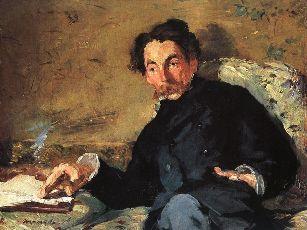
Stéphane Mallarmé by Manet, 1876








